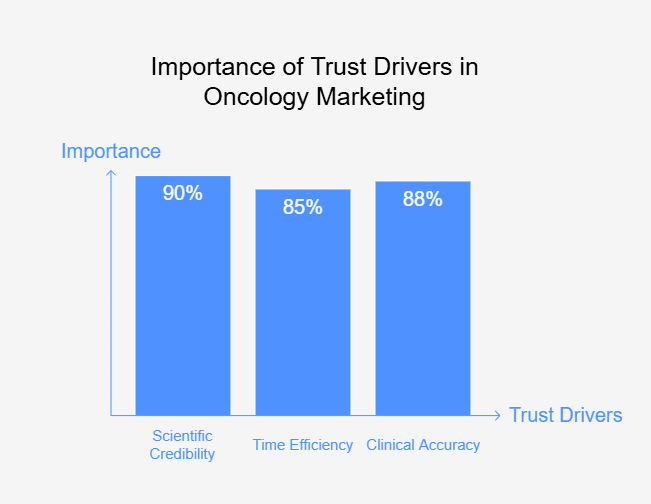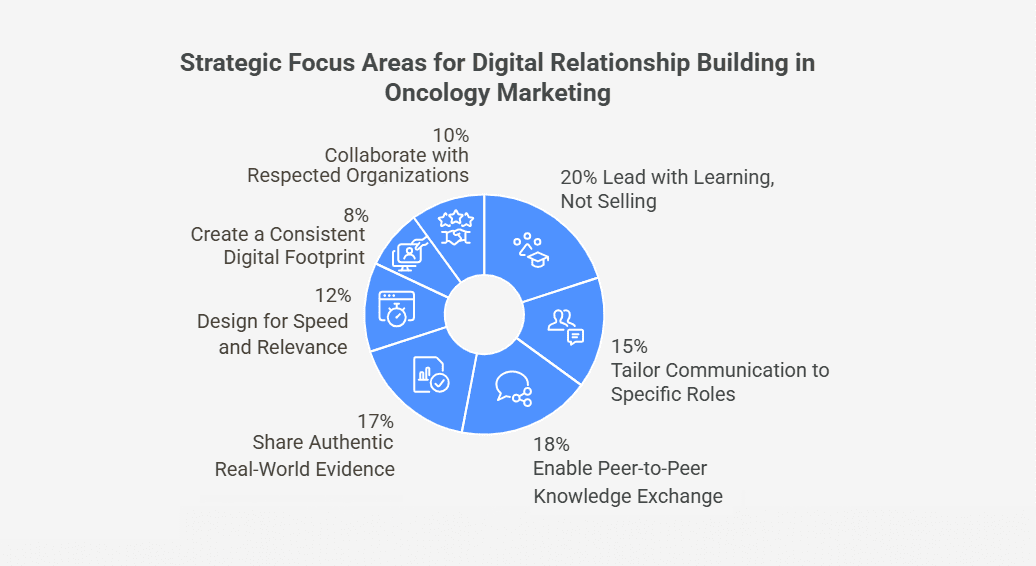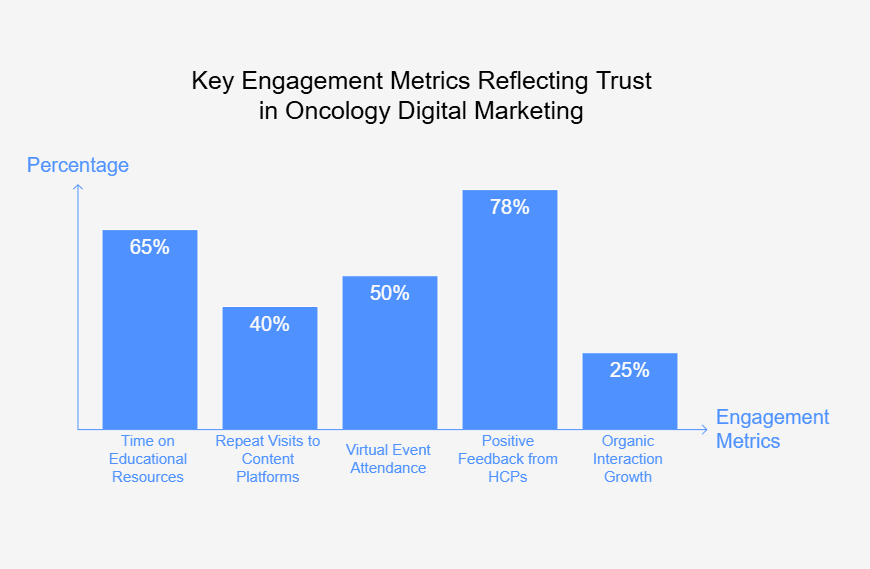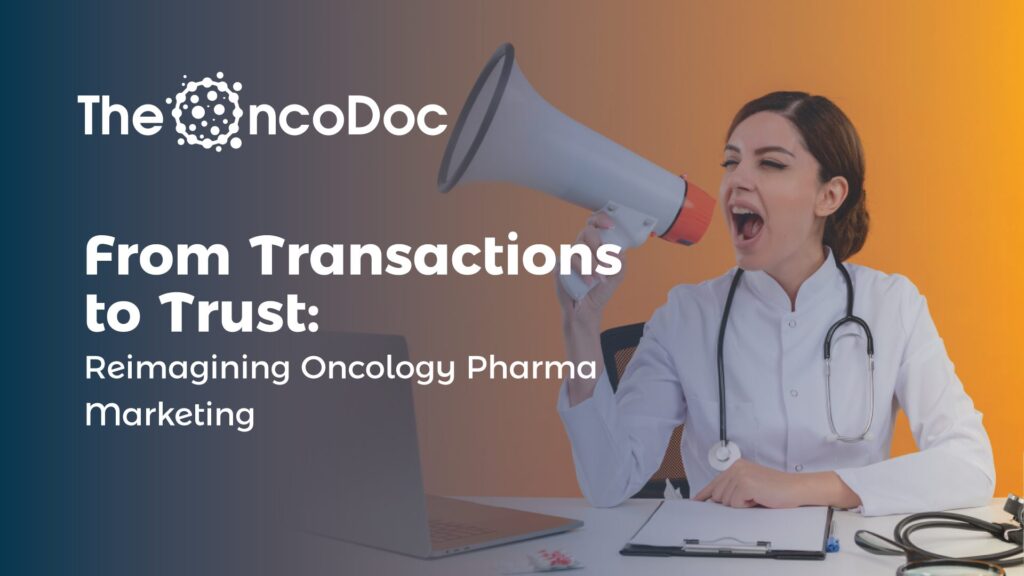Introduction: Moving Beyond Traditional Pharma Outreach
Oncology is evolving at an unprecedented pace, with scientific breakthroughs reshaping treatment possibilities. However, the way these innovations are marketed remains anchored in outdated, transactional methods. These traditional tactics often fail to connect with today’s oncologists, who seek genuine, evidence-driven engagement over promotional messaging. In an arena where clinical decisions carry significant emotional and life-altering weight, pharma marketers must evolve from product promoters to reliable partners in care.
Digital marketing offers a powerful avenue to foster that transformation. It enables pharmaceutical companies to engage with oncology professionals in a more meaningful, consistent, and trust-centric way. This article explores how digital tools and strategies can help brand teams build authentic relationships with clinicians that go far beyond the transactional.
Trust: The Bedrock of Contemporary Oncology Engagement
Oncologists work in high-pressure environments that require not just technical precision but also emotional resilience. Their decisions affect real lives daily, and they are constantly adapting to new research, therapies, and treatment protocols. In this setting, repetitive and sales-heavy content is often perceived as irrelevant or disruptive.
Why Trust Is Essential Today:
- Scientific credibility over promotional language: Oncologists value data and peer-reviewed evidence more than marketing jargon.
- Limited bandwidth: Time-efficient, high-impact communication is essential.
- Clinical complexity: Accurate, unbiased information supports better decision-making.
Earning a clinician’s trust can lead to stronger advocacy, greater openness to new treatments, and broader professional endorsement.

Digital Tools for Long-Term Relationship Building
Digital platforms should not simply serve as content distributors. When used thoughtfully, they become mechanisms for continuous, value-driven interaction with healthcare providers.
1. Lead with Learning, Not Selling
Educational content that contributes to clinical knowledge is far more impactful than promotional material. Offering resources that aid decision-making demonstrates your commitment to improving care.
Examples:
- Webinars with respected clinicians sharing recent insights
- Digestible summaries of pivotal clinical trials tailored to practical application
- Accredited e-learning programs that enhance professional development
2. Tailor Communication to Specific Roles
Each oncology professional whether medical, surgical, or radiation-focused has unique informational needs. Content should reflect these distinctions.
Approaches:
- Build in-depth profiles of your target audience segments
- Use CRM tools to personalize email campaigns and social posts
- Monitor digital behaviors to optimize content format and delivery timing
3. Enable Peer-to-Peer Knowledge Exchange
Healthcare providers often place more trust in insights from colleagues than from corporate sources. Creating spaces for professional dialogue enhances authenticity.
Strategies:
- Facilitate virtual roundtables for case discussions
- Sponsor peer-led online communities
- Collaborate with credible platforms to host continuing education events
4. Share Authentic Real-World Evidence
Honest presentation of real-world outcomes adds credibility. Balanced insights are more persuasive than selective highlights.
Tactics:
- Use simple, clean visuals to explain data trends
- Include testimonials from physicians and patient stories
- Provide transparent comparisons between clinical trial results and real-world data
5. Design for Speed and Relevance
Oncologists often navigate packed schedules. Your content should respect their time by being concise, informative, and easy to consume.
Best formats include:
- Brief video explainers on treatment mechanisms
- Podcasts under 10 minutes featuring thought leaders
- Email newsletters with digest-style summaries
6. Create a Consistent Digital Footprint
Stay visible on platforms oncologists already rely on, but keep the messaging subtle and informative rather than aggressive or sales-heavy.
Effective channels:
- Publish clinical updates on sites like Medscape
- Share educational content on LinkedIn targeting oncology professionals
- Use retargeting to re-engage users who previously accessed valuable resources
7. Collaborate with Respected Organizations
Partnering with trusted institutions enhances your brand’s legitimacy and expands your reach within the clinical community.
Collaboration ideas:
- Develop co-branded learning resources with medical societies
- Support research grants or awareness initiatives
- Deliver content through nonprofit or government-backed healthcare networks

Upholding Ethics in Digital Oncology Marketing
With broader digital access comes the responsibility to maintain the highest ethical standards. All content must be transparent, data-driven, and clinically reviewed.
Ethical guidelines to follow:
- Never exaggerate or distort clinical claims
- Clearly identify sponsored content
- Respect privacy standards for both clinicians and patients
- Adhere to regional and global regulatory frameworks, such as India’s UCPMP or the IFPMA Code
Following these practices not only ensures compliance but reinforces your reputation as a trustworthy partner.
Measuring the Impact of Trust
While trust itself is intangible, its effects can be measured through meaningful engagement indicators.
Metrics to monitor:
- Time spent on your educational resources
- Repeat visits to your content platforms
- Attendance and participation in virtual events
- Qualitative feedback from HCPs
- Growth in organic interactions and peer referrals
Digital analytics platforms like IQVIA, Adobe Experience Cloud, and Veeva can help turn this data into strategic insights.

Conclusion: Evolving from Marketer to Partner in Care
Digital transformation allows oncology pharma marketers to redefine their role in a way that prioritizes substance over slogans. By focusing on clinician education, relevance, and ethical integrity, brand teams can build enduring relationships rooted in mutual respect and shared goals.
Those who rise to the occasion will no longer be seen as just vendors they will become trusted collaborators in the fight against cancer. And with that trust comes something invaluable: influence that drives better outcomes for patients and stronger engagement with healthcare professionals.
The Oncodoc team is a group of passionate healthcare and marketing professionals dedicated to delivering accurate, engaging, and impactful content. With expertise across medical research, digital strategy, and clinical communication, the team focuses on empowering healthcare professionals and patients alike. Through evidence-based insights and innovative storytelling, Hidoc aims to bridge the gap between medicine and digital engagement, promoting wellness and informed decision-making.



